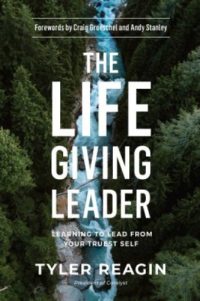What is identity-based leadership, how is it biblical, and how does it contribute to influencing others to achieve their own success?
Bible Gateway interviewed Tyler Reagin (@tylerreagin) about his book, The Life-Giving Leader: Learning to Lead from Your Truest Self (WaterBrook, 2018).
What does it mean to be a life-giving leader?
Tyler Reagin: To be a life-giving leader means you’re leading from your truest self. It’s someone who’s self-aware, self-accepting, and self-confident. They’re known for creating vibrant organizations and cultivating life-giving teams. To be a life-giving leader, you embrace that God has uniquely created you with specific talents and that he divinely calls you to lead from those particular strengths.
The entire concept of life-giving leaders is built on having something to give. Jesus created a simple yet profound visual of how we’re to do this. You cannot give away what you don’t have. Rivers without water are no longer rivers. Leaders without life flowing into them cannot be life-giving leaders.
This is how Jesus presented it: “I am the true vine, and my Father is the vinedresser….Abide in me, and I in you. As the branch cannot bear fruit by itself, unless it abides in the vine, neither can you, unless you abide in me. I am the vine; you are the branches. Whoever abides in me and I in him, he it is that bears much fruit, for apart from me you can do nothing” (John 15:1, 4–5).
How did you come to this message about life-giving leadership?
Tyler Reagin: This message began with the words, “If you’re not successful, it’s probably just your personality.” These words were said to me once by a leader and once by a friend. In those moments, the words pierced my heart, but they later turned out to be a profound gift.
The lesson I received from these two individuals was that my personality was going to set me up for floundering and not flourishing, for failure and not success. But Psalm 139 makes me believe differently:
You formed my inward parts;
you knitted me together in my mother’s womb.
I praise you, for I am fearfully and wonderfully made.
Wonderful are your works;
my soul knows it very well. (verses 13–14)
It was an important leadership moment that felt like a failure, but God used it to change my leadership and me forever. After years of inner work and embracing who God has called me to be, I’ve learned the power in owning your uniqueness, and I want other people to find the freedom that comes with that.
What’s the biggest mistake leaders make?
Tyler Reagin: There are quite a few common mistakes I see leaders facing regardless of circumstances, but the main obstacle in mind is getting lost in the trap of comparison. We live in such an interconnected world that it’s never been easier to see the work and play of everyone around us. And a challenge we have to face is choosing to live true to our authentic selves and not aiming to be somebody God never made us to be.
Comparison can lead to a false need to achieve more, which leads to a life defined by busyness and distraction. This is a rhythm of life that leads to another common challenge I see leaders facing, and that’s anxiety. Anxiety is real for many leaders, and I think it can stem from striving to prove something to ourselves and others. Regardless of our leadership circumstances, we need to lead from a posture of self-acceptance and confidence in our God-given identity.
Hebrews 11 reminds us of Abraham, Moses, David, and others whose names thousands of years later still define brilliant leadership. And every one of them led from a place of faith. Then the author of Hebrews drops this amazing truth on us [about being surrounded by a great cloud of witnesses]: Hebrews 12:1-3.
You write about leading from your truest self. What does that look like?
Tyler Reagin: At the end of the day, it looks like being satisfied in who God created YOU to be, not someone else. It means accepting that God designed you with your uniqueness, personality, and gifts all for the purpose he has for you. Once leaders accept that, leading from your truest self looks like walking in self-acceptance and experiencing the abundant life and freedom God intended for you. It means learning to love yourself, to stop chasing other people’s callings, and to seek freedom from wrong expectations.
One of the often quoted books in the Old Testament is the book of Psalms, which contains the writings of David that lay the foundation for life-giving leadership. If you believe Scripture was given to us by our Creator, then we need to connect his love and his belief in us with our leadership. Read the first part of this amazing passage: Psalm 139:1–12.
When you’re in need of God, he’s there. You don’t have to search. You don’t have to figure it out. He’s there, living inside you. He’s with you when you lead and when you choose not to lead. David was overwhelmed by this incredible idea, and we should be as well. It’s an “amazing grace” story of God staying with us.
By the way, it gets even better. This next passage gives me continued hope that God has a unique plan in my life and leadership. Listen to David’s beautiful reminder of God’s design of every person in Psalm 139:13–16.
What’s the most important leadership lesson you’ve had?
Tyler Reagin: The most important leadership lesson I’ve learned is that healthy leadership begins with being okay with who God created me to be. That’s a lot of what The Life-Giving Leader is about. Learning to live and lead from your authentic self. I believe God uniquely made each of us for a specific purpose, and the sooner we can embrace our uniqueness (gifts, passions, strengths, AND weaknesses), the sooner we can walk into the life God has called us to.
When leaders embrace this life-giving concept, how does that impact the culture of an organization?
Tyler Reagin: 1 Corinthians 13:4–6 is always a good reminder for me in this area. The entire goal of becoming a life-giving leader is to allow life to flow from you to others. As leaders, we’re called to create spaces in which grace can flow from us, allowing everyone around us to flourish.
And when you become a life-giving leader, you gain the ability to develop life-giving teams and a life-giving culture. The leaders around you will reach their full potential and capacity when you become a life-giving leader because they can flourish like never before. It’ll bring productivity, improved team performance, and fulfilled leadership journeys. The culture will be one filled with excitement, color, and hope; and these qualities will truly bring color to monotone organizations.
As the president of Catalyst and a leadership coach, you’ve heard all the top experts in this field. Who has influenced your leadership style?
Tyler Reagin: There have been a ton! A few people who’ve truly impacted my leadership journey are Andy Stanley (being under his leadership for ten years taught me foundational leadership principles I’ll lead from for the rest of my life), Patrick Lencioni, Simon Sinek, and Craig Groeschel.
Is there someone from the Bible you look to for leadership lessons?
Tyler Reagin: Jesus of course, but I’d also say David is someone I look to in the Bible for incredible leadership lessons. He was flawed, but God chose him and used him powerfully to transform the Kingdom. He was a brilliant poet who used song to articulate what he was wrestling with. He was a courageous warrior and a true, humble leader.
What would your team say you do to make Catalyst a life-giving place to work?
Tyler Reagin: That’s a hard question to answer! For me, this is where John 10:10—“My purpose is to give life in all its fullness”—comes into play.
I hope they’d say I create a life-giving work environment by caring for them as individuals, speaking into who God made them to be, and inviting God into everything we do. I always want to know how they’re doing and try to invest in their lives outside the office. I try to be there as much as I can to show them how leadership looks lived out and make sure we have a healthy work/life balance. I want to make sure we take breaks for prayer, moments to laugh, and times to celebrate one another. And I always want to make it a fun environment. The way I see it is that having fun is better than not having fun!
What do you teach your two young sons about leadership?
Tyler Reagin: I want my boys to grow up understanding that a big part of leadership is caring for others. Caring for your family, your friends, and your neighbors is critical for good leadership. Whether it’s helping around the house, thanking someone for their hard work, or serving in the community. When we take care of those around us, life flows and influence grows.
We’re called to manage our influence on others in light of what Jesus said is the most important priority: A religious leader asked, “Teacher, which is the greatest commandment in the Law?” And look how Jesus replied: “Love the Lord your God with all your heart and with all your soul and with all your mind.” This is the first and greatest commandment. And the second is like it: “Love your neighbor as yourself” (Matthew 22:36–39, NIV).
What is your favorite Bible passage and why?
Tyler Reagin: My favorite Bible verse is John 10:10. I love that Jesus came so that we may have life to the full and be free to have hope and grace in our lives. It’s the foundation of what my book and life message is all about.
Bio: Tyler Reagin is the president of Catalyst, a leadership development organization that exists to unify and equip leaders who love the church through resources and experiential events. Through live events, weekly podcast, digital resources, and a community-building app, the Catalyst team connects with over 100,000 leaders from around the world. Prior to Catalyst, Reagin served for seven years under the leadership of Andy Stanley as the Service Programming director with North Point Ministries. He received his Masters of Divinity from Gordon-Conwell Theological Seminary and serves as a leadership coach for teams and organizations. He’s been married to Carrie for over 16 years and has two boys Nate and Charlie. When he’s not working, Tyler is hanging out with his friends and family on the golf course.















